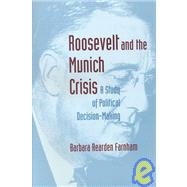Roosevelt and the Munich Crisis
, by Farnham, Barbara Rearden- ISBN: 9780691070742 | 0691070741
- Cover: Paperback
- Copyright: 10/2/2000
Franklin Roosevelt's intentions during the three years between Munich and Pearl Harbor have been a source of controversy among historians for decades. Barbara Farnham offers both a theory of how the domestic political context affects foreign policy decisions in general and a fresh interpretation of FDR's post-Munich policies based on the insights that the theory provides. Between 1936 and 1938, Roosevelt searched for ways to influence the deteriorating international situation. When Hitler's behavior during the Munich crisis showed him to be incorrigibly aggressive, FDR settled on aiding the democracies, a course to which he adhered until America's entry into the war. This policy attracted him because it allowed him to deal with a serious problem: the conflict between the need to stop Hitler and the domestic imperative to avoid any risk of American involvement in a war. Because existing theoretical approaches to value conflict ignore the influence of political factors on decision-making, they offer little help in explaining Roosevelt's behavior. As an alternative, this book develops a political approach to decision-making which focuses on the impact that awareness of the imperatives of the political context can have on decision-making processes and, through them, policy outcomes. It suggests that in the face of a clash of central values decision-makers who are aware of the demands of the political context are likely to be reluctant to make trade-offs, seeking instead a solution that gives some measure of satisfaction to all the values implicated in the decision.






